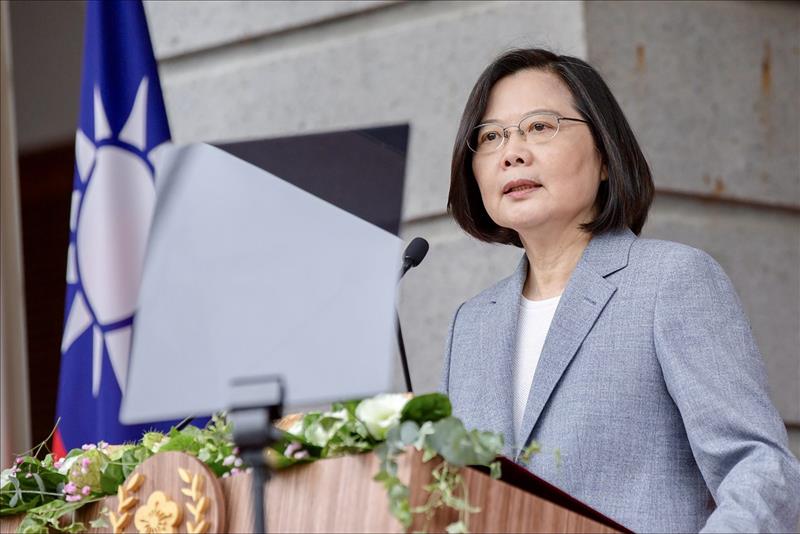
Losing another ally would have wide effects for Taiwan
(MENAFN- Asia Times) After marking 80 years of diplomatic relations this year, Taiwan and Honduras may be headed for a split should a left-wing opposition party win the presidential election in November.
At a press conference on Wednesday, the candidate of the Liberty and Refoundation Party (LIBRE), Xiomara Castro, announced she would“immediately open diplomatic and commercial relations with China” if she wins the November 28 election.
Castro, the wife of deposed former president Manuel Zelaya, will vie for the presidency along with Tegucigalpa Mayor Nasry Asfura of the ruling National Party and Salvador Nasralla, who narrowly lost to incumbent Juan Orlando Hernandez in 2017.
Taipei immediately responded to her remarks, with its Foreign Ministry stating ,“Our side reminds Honduras that promises by the Chinese government are usually flashy and false, and they are consistent ploys to sabotage Taiwan's diplomatic relations with our allies,” while pledging to emphasize Taipei's past goodwill efforts and contributions toward the Honduran people ahead of the election.
Since the election of Democratic Progressive Party (DPP) leader Tsai Ing-wen to the presidency in 2016, Taiwan has lost seven allies to Beijing, including Panama in 2017 and El Salvador and the Dominican Republic in 2018. Paraguay, another diplomatic ally of Taipei, has accused Beijing of “blackmail” by offering Chinese vaccines in exchange for switching its diplomatic recognition to China.
One important factor behind Tegucigalpa's potential switch of diplomatic recognition to Beijing is access to Covid-19 vaccines. While many Beijing-friendly Latin American countries have accessed vaccines from China and other nations, Honduras, one of Taipei's 15 remaining diplomatic allies, has experienced difficulty, especially from China, in securing vaccines to fight its Covid-19 outbreak.
Tegucigalpa even offered to open up a trade office in China to improve relations and gain access to Chinese vaccines. Carlos Alberto Madero, Honduras' chief cabinet coordinator, previously said vaccine access could“definitely lead to changes in foreign policy” and told the Financial Times in May that although Tegucigalpa wished to maintain long-standing ties with Taipei, access to vaccines was“much more urgent than anything else.”
So far, Honduras has administered more than 4 million doses of Covid vaccines – enough to inoculate about 21% of the population with two doses.
Washington has long considered Central America within its sphere of influence and is loath to welcome any additional Chinese influence in the region, especially discouraging Taiwan's remaining Latin American allies from changing sides.
Under the Taiwan Allies International Protection and Enhancement Initiative (TAIPEI) Act, passed into law in March 2020, the US is obligated to“support Taiwan in strengthening its official diplomatic relationships.” One such effort by Washington includes the donation of 3 million vaccines to Honduras, representing 75% of the country's received doses.
Whether or not Washington's efforts to support Taipei as a diplomatic ally of Tegucigalpa play a game-changing role in the November 28 election results remains to be seen.
If Hondurans do elect Castro and discard 80 years of good relations with Taiwan and 191 years of close relations with the US based on promises from Beijing, Washington's goodwill donation of 3 million vaccines to the Honduran people will still have gone to a good cause – that of preventing further spread of the pandemic.
Washington will still need to work with the incoming administration on other matters, such as illegal immigration, drug trafficking, and transnational criminal gangs.
For Taipei, the loss of an 80-year-old friend would be regrettable, and would mean one fewer vote on its behalf at the United Nations or other international institutions, given that Taiwan is not a member of the UN or its sub-organizations. But the value of 14 versus 15 votes to Taipei is fairly insignificant when weighed against 179 other votes – many influenced by Beijing.
More important to Taipei than maintaining small formal allies is having large influential friends like the US, the European Union, and the Quad, which can help support the de facto state diplomatically, politically, militarily, and economically – despite a lack of formal recognition.
Gary Sands is a senior analyst at Wikistrat, a crowdsourced consultancy, and a director at Highway West Capital Advisors, a venture capital, project finance and political risk advisory. He has contributed a number of op-eds for Forbes, US News and World Report, Newsweek, The Diplomat, The National Interest, EurasiaNet, and the South China Morning Post. He spent six years in Shanghai, four years in Ho Chi Minh City, and is now based in Taipei.

Legal Disclaimer:
MENAFN provides the
information “as is” without warranty of any kind. We do not accept
any responsibility or liability for the accuracy, content, images,
videos, licenses, completeness, legality, or reliability of the information
contained in this article. If you have any complaints or copyright
issues related to this article, kindly contact the provider above.


















Comments
No comment